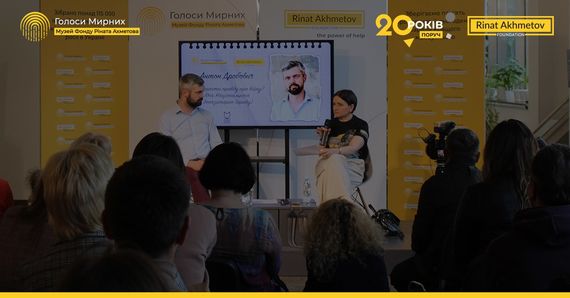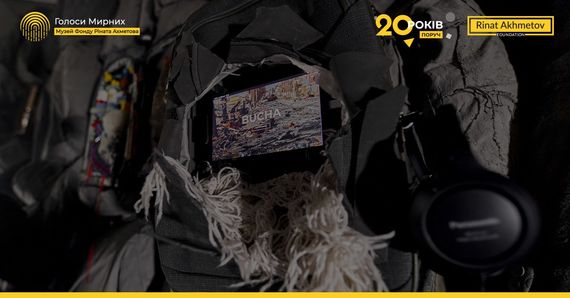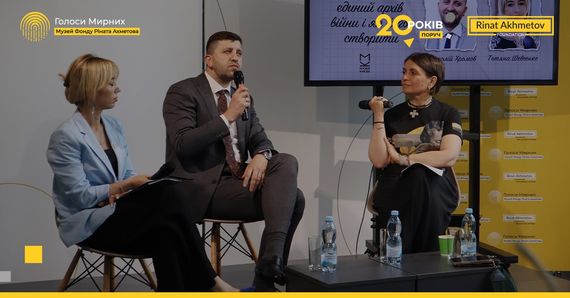“Memory can make us people who will change Ukraine”: an interview with Maksym Ostapenko, Director of the Kyiv-Pechersk Lavra, for The Museum of Civilian Voices by Rinat Akhmetov Foundation
.png?content_type=image%2Fpng&disposition=inline%3B+filename%3D%22SHablon-NOVYY-sayt+%25284%2529.png%22%3B+filename%2A%3DUTF-8%27%27%25D0%25A8%25D0%25B0%25D0%25B1%25D0%25BB%25D0%25BE%25D0%25BD-%25D0%259D%25D0%259E%25D0%2592%25D0%2598%25D0%2599-%25D1%2581%25D0%25B0%25D0%25B9%25D1%2582%2520%25284%2529.png)
A public interview with Maksym Ostapenko, Director General of the Kyiv-Pechersk Lavra National Reserve and Candidate of Historical Sciences, took place in Kyiv. The event was held as part of the VOICES exhibition of The Museum of Civilian Voices by Rinat Akhmetov Foundation. The conversation was moderated by Anastasiia Platonova, cultural critic and curator.
Maksym Ostapenko expressed his view on the current process of memorialising the events of the war and the main pain points of this process.
“Memory allows us to be, allows society to feel itself complete. The war that is taking place now is largely a war for our memory, or rather, for its cleansing. The enemy pays much more attention to historical memory and our identity than we do. Each of us must become a data bank that will carry on our personal memory, and memorialisation needs much more attention at the state level,” the historian emphasises.
According to Maksym, after the war, historical memory sites should help heal and become the basis for the revival and birth of a new Ukraine.
“We will never be the same as before the war. But we must remember. And this is our duty to those who will not be able to do so. I have already lost 11 friends in the war. I have to figure out how to ensure that their heroic deeds and lives are preserved for future generations and become the foundation for building something they dreamed of. Memory can make us the people who will change Ukraine,” he expert says.
When asked about the problems in the environment of memorialisation in Ukraine, the key points of this space, Maksym Ostapenko answers as follows:
“A huge challenge is how to remember everyone. In Kyiv, a wall of memory spontaneously appeared on the walls of St Michael's Monastery, and it is already full. We need to turn the spontaneous into a systematic one that will remind us, inspire us, and become a safeguard. By honouring heroes, we must transmit the values and unbreakable will that surprised the world. Such places should become points for shaping the future and identity. We must bring a child there, and he or she has to leave differently.”
The director of the Kyiv Pechersk Lavra explained how centuries-old monuments can help Ukrainians memorialise the present.
“The Lavra will be a thousand years old in a quarter of a century. It is not a museum, not a reserve, not just a monastery, not just an architectural or archaeological monument. It is a national shrine. The objects that appeared thousands of years ago should help us find the right forms because, for centuries, people have been accumulating the experience of worship, and this is encoded in the monuments. If we do not rethink our past and the traumatic events of the present, if we do not connect ourselves to our millennial roots, we are doomed. That is why history and memory are of great importance,” explains Maksym.
The historian emphasises the value of Ukraine's diversity, including religious diversity: during the war, Ukrainian chaplains represent Orthodox, Catholics, Protestants, the Jewish community, and Muslims. They are all defending Ukraine together.
“History is a multifaceted crystal, in which you can always see only one side. The more facets and manifestations it has, the brighter it becomes and the more light it gives off around it. The diversity of colours strengthens Ukraine, you just need to put it together in the right way,” says Maksym Ostapenko.
The public interviews are part of a series of cultural events held by the Museum of Civilian Voices aimed at preserving the memory of the war. Follow the announcements of the events on the Rinat Akhmetov Foundation's social media and on the website of the Museum of Civilian Voices, Museum of Rinat Akhmetov Foundation.



